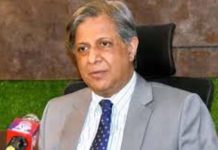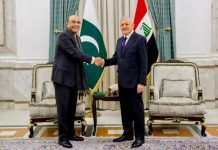ISLAMABAD, SEPT 03 (DNA) – The Islamabad Policy Research Institute organized a Special Roundtable on Mechanism for Effective Revenue Collection in Pakistan: Ways and Means here in Islamabad today.The roundtable was chaired by Dr. Waqar Masood Khan, Former Federal Secretary for Finance Division, while Mr. Nisar Muhammad Khan, former Chairman FBRDr. Manzoor Ahmad, Pakistan’s former Ambassador to WTO, Mr. Tariq Bajwa, Former Chairman FBR & former Governor,State Bank of Pakistan and Mr. Ali Arshad Hakeem, former Chairman FBR, were amongst the esteemed speakers.
The participants emphasized that taxation policies are part and parcel of the economic edifice of modern economies. Through the correct utilization of revenue generated by virtue of efficacious taxation policies, the aim is to establish sound governance and to preventthe scenario where an economy bucklesunder bloated debt.Contextualizing the matter in the case of Pakistan which has not had a primary surplus for many years, there was consensus amongst the participantsthat revenue collection is the remedy for several economic maladies that beset Pakistan including poor tax-to-GDP ratio and debt servicing which have marred the already stunted economy. Good governance, uninterrupted social service delivery, robust infrastructure development and controlled inflation can materialize through broadening the tax base.
Fiscal deficit was described as the mother of all evils in the case of Pakistan; identifying that the current government is trying to slash down on its expenditure but the revenue collection side of it needs to be addressed since last fiscal year alone witnessed a 1 % decline in the revenues, and targets set for growth are no close to materialization.
In addition, the speakers also highlighted that direct taxes make up only around 34% compared to indirect taxes which were not only generally regarded as regressive but also contribute to low economic growth as it leads to multi-dimensional poverty; as the middle and lower strata of the society is at its receiving end.
Referring to ease of doing business; according to the World Bank Pakistan ranks 173 out of 190 countries. With that in mind, foreign investment cannot be brought into the country. Ease of doing business can be significantly enhanced by incorporating simplicity in tax policies, providing a level playing ground especially to small and medium-sized enterprises and cut down on tariffs which can also make goods competitive in the international market.
Analogies were drawn to Chile, Turkey and Vietnam which faced similar challenges of economic growth and tax collection but were able to bring about a major turnaround to the extent that at present Vietnam alone has exports nearing $200 billion.
Along with this, to improve revenue collection, Pakistan’s cash economy must be capitalized. Agriculture and the service sector ought to contribute much more to the tax base.
Concessionary tax cuts should not be only confined to specific industries but the burgeoning Internet economy which has the potential to add $100 billion to our economy must be included as well.
Appraising the performance of FBR, the speakers stressed upon the institution’s capacity constraints to meet the 5500 billion tax target largely because FBR has not evolved in line with our financial policy.
It was suggested that the FBR needs to introduce a Fiscal Register for the tax payers and there is a need for officers to be abreast of the world view and the modern methods of tax collection being exercised.
Another recommendation put forward was to conduct Data Mining in order to locate new tax payers with the assistance of NADRA.
The speakers recommended that the modus operandi of tax registration ought to be streamlined and made hassle free by FBR, in order to address the trust deficit between the tax payer and the tax collector or the government for that matter.
The government also needs to modernize the whole process of tax collection and tax refunds, along with limiting discretionary powers of the tax collector.
When the average Pakistani is confident that their tax is not slipping through the crevicesin the system, and that they will reap the benefit in the shape of improved infrastructure, healthcare, employment opportunities, there will be behavioral and attitudinal changes in the public, it was stressed.
Enhancement of tax-to-GDP ratio which currently stands at around 10% to 13%, increased revenue collection free of corruption, widening of tax basewere notified as key areas of interest for the purpose of redressing Pakistan’s shrinking economy.
It was concluded thatsuch progressive measures will lead to an environment which will be the stimulus for economic revitalization and that Pakistan must make the most of the inflection point, as manufacturing units are being moved away to cheaper markets.
The roundtable also includedMr. Ayaz Asim, Chief Financial Officer APTMA, Dr. Bushra Yasmin, Chairperson Department of Economics, FJWU, Dr. Saima Shafique, Head Department of Economics, NUML and Dr. Muhammad Ali Syed, Senior Assistant Professor, Bahria University Islamabad
Dr. Karim Khan, Mr. Fuzail Zubaid Ahmad, Mr. Zil Ur Rehman Qureshi were also amongst the participants.=DNA
=========











